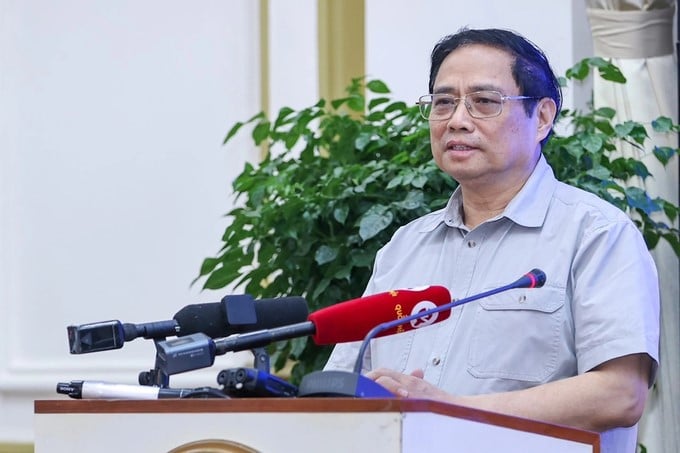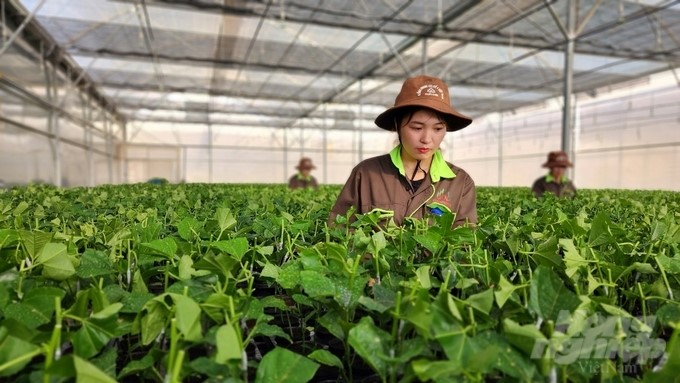May 29, 2025 | 20:33 GMT +7
May 29, 2025 | 20:33 GMT +7
Hotline: 0913.378.918
May 29, 2025 | 20:33 GMT +7
Hotline: 0913.378.918

Prime Minister Pham Minh Chinh said, " We will find the best solutions for Ho Chi Minh City to do better in the upcoming time."
The Prime Minister assigned the Ministry of Planning and Investment to chair and coordinate with the Ministries of Finance, Agriculture, and Rural Development and relevant agencies in urgently finalizing the Decree amending and supplementing some articles of the Decree 57/2018/ND-CP on mechanisms and policies to encourage enterprises’ investment in agriculture and rural areas. The amendment decree is required to be submitted to the government in the second quarter of 2023.
The Prime Minister requested that ministers, heads of ministerial-level agencies, government-attached agencies, and chairmen of the People's Committees of provinces and centrally run cities focus on leading and directing the following tasks:
Paying more attention to three growth motivators: domestic consumption, exports, and investment. Ensuring food security in all situations. Organizing agricultural production in the direction of multi-value, large-scale, professional, modern, efficient, circular, low-emissions, and environmentally friendly; thereby meeting domestic and international standards and having a highly competitive power. Promoting the development of cooperatives and cooperative models in agriculture and replicating models of chain linkage between farmers, scientists, managers, businesses, and credit institutions.
Promoting technological innovation, digital transformation in agriculture, applying high technology, post-harvest processing and preservation technology, and considering this a breakthrough to enhance the added value, efficiency of production and business, and competitiveness of Vietnamese agricultural products.
The Ministry of Science and Technology was assigned to chair, coordinate with relevant ministries and agencies on urgently finalizing the draft Decree regulating High-tech Park (including High-tech Agricultural Park), and submit them to the Government in the second quarter of 2023. The Ministry of Science and Technology is in charge of summarizing the pilot scheme of the public-private partnership mechanism, co-financing the implementation of science and technology tasks according to the Prime Minister's Decision No. 1931/QD-TTg dated October 7, 2016, and on that basis, proposing competent authorities to consider and promulgate new mechanisms and policies to meet practical requirements.
Diversifying agricultural products and pushing up deep and refined processing in order to overcome the situation of "falling in value", depending on the season and increase the added value of agricultural products. Effectively developing the One Commune One Product (OCOP) program.
Promoting branding, trade promotion, product advertising, and e-commerce; developing and diversifying input supply chains; and expanding agricultural products' consumption markets. Maintaining and promoting traditional markets; continuing to negotiate for new market openings to reduce dependence on a few markets; proactively implementing appropriate trade remedies to protect domestic production and promote exports. Strongly and effectively implementing the movement "Vietnamese people give priority to using Vietnamese goods" and the scheme on renewing the business method of consuming agricultural products for the 2021-2025 period, with a vision to 2030.

Workers are taking care of transplants in the Nafood Group's passion fruit nursery garden, using high technology. Photo: Van Viet.
According to the head of government, in the first months of 2023, the world situation continued to be complicated and unpredictable, along with strategic competition among big countries and many countries tightening monetary policy, which impacted negatively on the global economic recovery and growth.
Thanks to the Party’s leadership, the participation of the whole political system, branches, and localities, the people’s consensus and active participation, the business community, and international support, our country’s socio-economic situation in the first 3 months of 2023 achieved many important results: the macro-economy was stable, inflation was controlled, major balances of the economy were ensured, and the growth in the first quarter was estimated at 3.32% over the same period last year, of which the agricultural sector increased by 2.52%.
However, the growth of the whole country and agricultural sector is facing many difficulties and challenges: the price of input supplies for agricultural production ranks at a high level, the market is narrowing, and some traditional markets are meeting with difficulties, affecting production, business, and people's lives.
The work of preventing and combating illegal, unreported, and unregulated (IUU) fishing has achieved some positive results, but no significant changes have been made. The implementation and disbursement of three national target programs are still slow and unsatisfactory, and some problems have not been completely resolved.
The Prime Minister also criticized four provinces: Binh Dinh, Khanh Hoa, Binh Thuan, and Kien Giang, for continuing to allow local fishing vessels to violate foreign waters from the beginning of 2023 until now, and asked the provinces to organize a serious review, clearly define the responsibilities of local heads and relevant units, and report to the Prime Minister before May 15, 2023.
Translated by Huyen Vu Thu

(VAN) The mutual export of agrifood products between the European Union (EU) and the United Kingdom (UK) must occur again without certification, border controls or other red tape. This was agreed at the UK-EU summit.
/2025/05/22/5121-2-173645_677.jpg)
(VAN) NBSAP Tracker identifies strengths and areas for improvement in the National Biodiversity Strategy, based on each region’s priorities and capacities.

(VAN) The draft amendment to the Circular on rice export trading stipulates a periodic reporting regime for rice exporting enterprises.

(VAN) Dong Thap farmers attained an average profit margin of 64% during the summer-autumn 2024 crop (first season), while An Giang and Kien Giang farmers followed with 56% and 54%, respectively.

(VAN) As a doctoral student doing research on renewable energy and electrification at Harvard University, the author shares his musings on electricity, nature, and countryside memories.

(VAN) The decree on Extended Producer Responsibility (EPR) ensures transparent management and disbursement of support funds, avoiding the creation of a “give-and-take” mechanism.

(VAN) Hue City rigorously enforces regulations regarding marine fishing and resource exploitation, with a particular emphasis on the monitoring of fishing vessels to prevent illegal, unreported, and unregulated (IUU) fishing.